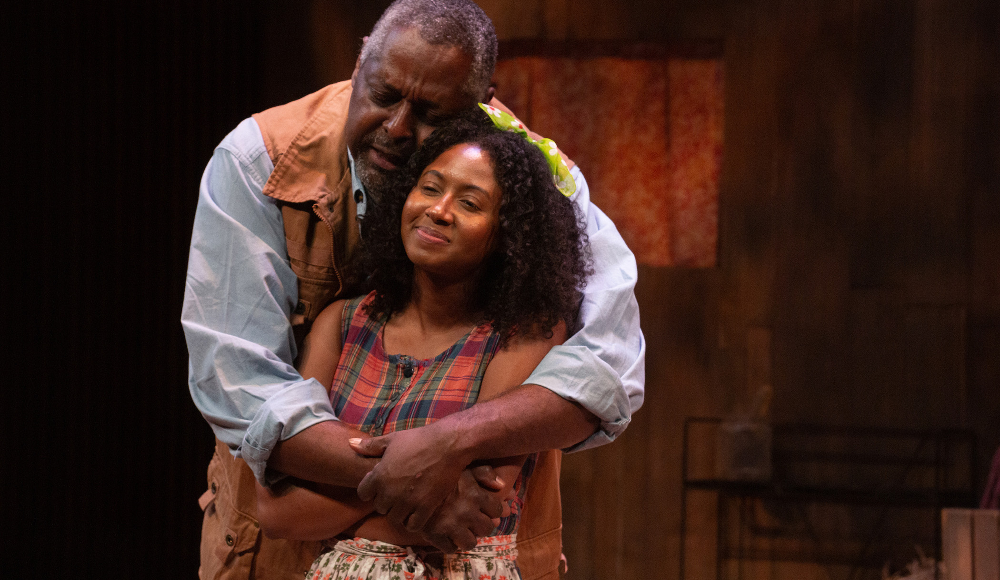By Ernest Kearney — Valley Song is in many ways unique among South African playwright Athol Fugard’s works.
It is shorter than the majority of his dramas and unlike the realism present in the bulk of his plays such as Master Harold…and the Boys, and Road to Mecca, this work employs a distinctly theatrical device. It is the first of Fugard’s post-Apartheid plays; it is less rigorously political in nature; the setting is Fugard’s birthplace the semi-desert region of Karoo; and it is, certainly, one of his gentlest plays, if not the most so.
The Author (played by Michael A. Shepperd) comes before the audience and addresses them directly. He shows them pumpkin seeds, which he holds in his hands and explains the proper season for, and the planting demands they require. In speaking admiringly of the land’s harsh beauty, the Author also recounts the life of Buks, the elderly black tenant farmer who has worked the land for most of his seventy-six years.
The Author delivers the play’s preamble in prim and proper “Queen’s English,” except that the “A’s” are pronounced as “eh’s,” which is the particular parlance associated with the majority of white South Africans. This is slightly disconcerting being as Shepperd is not white.
Then at one point, the Author places a cap on his head and suddenly the white urbanite transforms into Buks, the lowly native tiller of the land who sings a song he learned from an Italian POW when he served as a prison camp guard during World War II.
Shepperd proceeds to play both roles, switching skillfully and seamlessly between the two. In the original Johannesburg production as well as the New York’s Manhattan Theatre Club production and the staging by LA’s Mark Taper, Fugard, himself, performed the dual roles of the Author and Buks.
This device is possible because, unlike the bulk of Fugard’s works, in Valley Song the conflict emanates only tangentially from racial matters, it is inter-generational tensions that drive the drama.
The source of this is the relationship between Buks and his seventeen-year-old granddaughter Veronica (Belle Guillory), who was raised from birth by him and his now deceased wife. But Veronica longs to leave her isolated life on the barren, empty veldt and to live in the city of Johannesburg. There she can pursue her dream of finding fame as a singer. But her dream is Buks’ nightmare. For Buk’s beloved daughter, Veronica’s mother, had run off to Johannesburg with a man from the village.
And it was Johannesburg where his pregnant daughter would be abandoned, and where his beloved, long dead wife would die giving birth to a child.
The conflict that arises pits Veronica not only against her grandfather’s refusal to allow her to go, but also the Author’s discouragement of her even considering the attempt.
In Veronica’s dreams Buks sees only the death of his beloved daughter, while the Author sees in her dreams only the betrayal of his own. The land, which to Veronica is a prison is to both Buks and the Author a sanctuary.

I have long been an admirer of the Long Beach’s International City Theatre. While I often find their choice of material such as Abigail/1702, Silent Sky and the Cardboard Piano questionable, their prowess in staging and the unparalleled professionalism they bring to each and every production never flags.
Valley Song is a different matter.
Valley Song is quite simply a perfect storm of excellence.
Guillory embodies the promise and pain of youth, reminding us all of that intoxicating and terrifying period when our lives were tightropes woven from dreams and hopes stretching out before us with no net below.
Shepperd’s performance is a study of talent burnished by fineness and intelligence. Shifting between his dual roles he, dexterously, infuses each with solid and discrete differentials while subtly alluding to the humanity they share.
The usual ICT stalwarts make their significant contributions to this production. Yuri Okahana-Benson’s set, Crystal R. Shomph’s lighting design, and the costumes of Kimberly DeShazo all sculpt the stage’s arena to fulfill the play’s needs precisely.
I believe, of the many productions I have enjoyed at ICT, this may be the first I’ve seen that Artistic Director caryn desai has directed. And direct she does indeed, blending all the crafts, skills and talents which are surfeited on her stage to fashion a symphonic perfection.
Fugard’s plays are celebrated, and justly so, because they awoke in audiences worldwide a righteous indignation over a government’s cruel and unjust maltreatment of an entire people.
In Valley Song, there is no cause for indignation, only an appeal for acceptance. Acceptance that the dreams of old men are meaningless when gauged against those of the young.
For no matter the pain or joy, the failure or success, old dreams of old dreamers are only relics.
It is in the dreams of youth in which the future lives.
(NOTE: Michael A. Shepperd, Belle Guillory in Valley Song (Photo by Kayte Deioma)
* * *
INTERNATIONAL CITY THEATRE
Long Beach Convention & Entertainment Center
330 East Seaside Way
Long Beach, CA 90802
For Information on International City Theatre Productions Go To: http://www.internationalcitytheatre.org/





